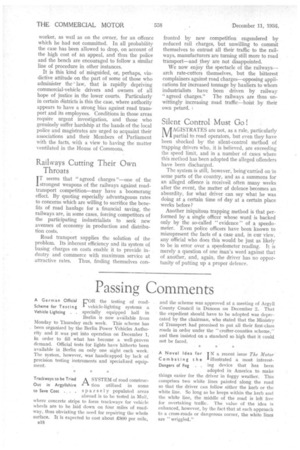Railways Cutting Their Own Throats
Page 36

If you've noticed an error in this article please click here to report it so we can fix it.
I T seems that "agreed charges "—one of the strongest weapons of the railways against roadtransport competition—may have a boomerang effect. By quoting especially advantageous rates to concerns which are willing to sacrifice the benefits of road haulage for a financial saving, the railways are, in some cases, forcing competitors of the participating industrialists to seek new avenues of economy in production and distribution costs.
Road transport supplies the solution of the problem. Its inherent efficiency and its system of basing charges on costs enable it to provide industry and commerce with maximum service at attractive rates. Thus, finding themselves con fronted by new competition engendered by reduced rail charges, but unwilling to commit themselves to entrust all their traffic to the railways, manufacturers are turning still more to road transport—and they are not disappointed.
We now enjoy the spectacle of the railways— arch rate-cutters themselves, but the bitterest complainers against road charges—opposing applications for increased tonnage by hauliers to whom industrialists have been driven by railway "agreed charges." The railways are thus unwittingly increasing road traffic—hoist by their own petard. I




































































































